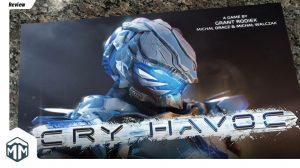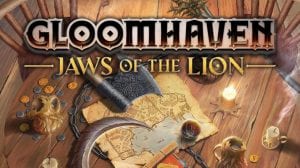Over the 10-ish years that I’ve been in the hobby, I’ve purchased a lot of games. Starting out as a new gamer, I bought games almost indiscriminately. As the years have passed though, I’ve become a lot more selective. Here are some often-heard selling points that may appeal to others, but don’t really stick for me.
Board Game Designer
One mistake that I have made in the past is assuming that if I like one game by a particular game designer, I will like all of their games. Sadly, I have found that this is not the case. Even though many designers tend to stick to a recognizable design ethos—Stefan Feld and Uwe Rosenberg come to mind—I’ve found that even the designers of my favorite Top 10 level games don’t have a consistent hit rate with me. I absolutely adore Corey Koniezcka’s Star Wars: Rebellion, but neither 3000 Scoundrels nor The Initiative really hit for me. Sleeping Gods is an absolute masterpiece, but Ryan Laukat’s Above and Below just didn’t land. While there are designers that I own multiple of their designs, like Matt Leacock’s Pandemic and Daybreak, my ears no longer perk up and take notice of an upcoming game simply because a designer’s name is attached to it.
Replayability
One buzzword I hear often is the concept of replayability. Reviewers will often rave about how thrilled they are that a game is replayable, most often through some amount of variable setup, asymmetric factions, or variety of in-game strategies to explore. In the same way, some people will pan a game if they feel like there isn’t enough variety from play to play. Here’s the thing: if I enjoy playing the game, it is inherently replayable. I don’t need some smorgasbord of variable options to choose from to enjoy my time. Sometimes you just want to go to your favorite diner and order the same roast beef sandwich because they cook it to perfection. Throw in the fact that my gaming opportunities are increasingly limited and often with new players, I rarely have a chance to play a single game enough times to even care to dig in and explore all possible avenues within a design structure.
Expansion Content
Does this sound familiar to you?
Step 1: Buy a game.
Step 2: Fall in love with said game.
Step 3: Buy loads of expansions.
Step 4: Never get around to playing the expansions.
Step 5: Sell the game.
Vindication and Suburbia, both games I whole-heartedly enjoy, have fallen victim to this sad cycle. Even now, I’ve got a handful of games that are dangerously hovering between steps 4 and 5. I’ve become anti-expansion, particularly if the expansion adds a new game mechanic, an added element of complexity, or an optional module that requires additional pre and post configuration. This goes hand-in-hand with the previous point. Expansions may add replayability, but if I’m not able to take advantage of that, I just don’t need that expansion.
Combos Upon Combos
I can’t count the number of times I’ve heard the cringe-worthy “combo-tastic” used when praising a game. From newer releases like Earth and Endless Winter: Paleoamericans, to older mainstays like Dominion, Everdell, and Gizmos, one of the major points of emphasis is how they let you pull off a long-string of actions triggering other actions, zeeping your zorp that meeps your morp, letting you bleep your blorps, resulting in one monstrosity of a turn that Rube Goldberg himself would cheer. This kind of elongated action-chaining, usually more utilized by experienced players, can shine a disheartening spotlight of inadequacy to the new and/or perhaps less technically-adept player. It also creates a disparity of turn length and effectiveness that I find irritating. I don’t mind player downtime between turns. I just like to feel like we’re all on some sort of equal footing. I have no doubt that I’m in the minority here on this one, but I dislike it all the same.
Quickness of Play
Like the previous entry, this is definitely a matter of personal preference for me. Straight up, I don’t care how long a game is. I care how fun the game is. I am equally excited for a quick round of Santorini as I am for a daylong marathon session of Twilight Imperium. Sure I might have more opportunity to play the former, but I’d play either game because I love both of them. There are plenty of people out there who would prefer playing more games in a session over less. I prefer playing better games, regardless of length. The fact that a game is quick doesn’t make it inherently better for me. Granted the type of games I generally go for—thematic with plenty of narrative, either built-in or emergent—means that I’m usually setting aside a good chunk of time to game anyway. I’m more than happy to fill every second of that with a single game if I enjoy it enough.
Brain-Burning Depth
I enjoy strategy. I can appreciate complexity. I can even get down with some amount of mental frustration, but if a game is advertised as brain-burning, I almost instantly check out. I play games to relax and have fun. I do enough big-brain thinking at work. The last thing I want to do after an intellectually challenging day of work is come home and have to fire off those same tired neurons. I know that a substantial element of modern game design involves sort of mental puzzle, but I draw the line when it starts to feel like work. Brain-burning, extremely thinky games that require a high level of mental overload just to take a turn transforms my experience from an enjoyable pastime to a lumbering chore.
There are a lot of reasons to buy a game. These six happen to be some that don’t mean much to me. I realize that this list is extremely subjective. So what about you all? I’d love to hear your thoughts on what does or doesn’t sell you on a game. Who knows? Maybe I’ll find another way to make my wallet happier and not buy that brand new hotness.













Add Comment